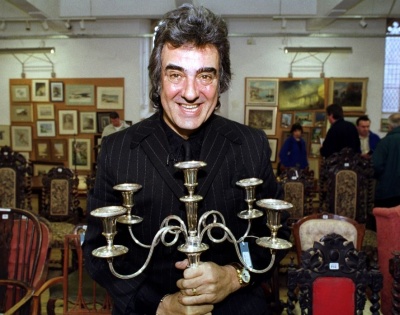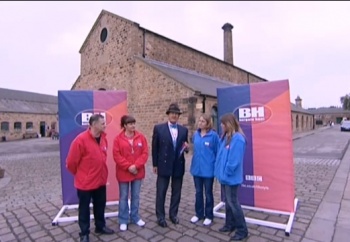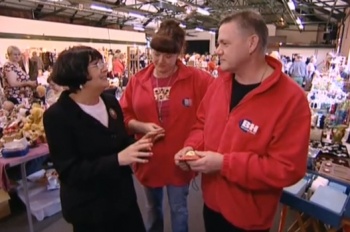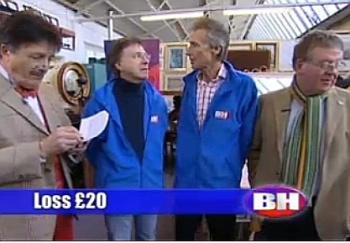Bargain Hunt
Contents |
Host
David Dickinson (13 March 2000 - 13 November 2004) (primetime only from 24 February 2003)
Tim Wonnacott (daytime, 24 February 2003 to January 2016)
Anita Manning (guest presenter, 2015)
Paul Laidlaw (guest presenter, 2015)
Christina Trevanion (guest presenter, 2015)
Charles Hanson (guest presenter, 2015)
Charles Hanson, Eric Knowles, Paul Laidlaw, Anita Manning, Thomas Plant, Charlie Ross, Natasha Raskin Sharp, Christina Trevanion (rotation, 2016 to present)
Co-hosts
Various antiques experts including Kate Alcock/Bliss, David Barby, James Braxton, Michael Hogben, Anita Manning, Adam Partridge, Philip Serrell, Mark Stacey, Catherine Southon
Broadcast
BBC West for BBC One, 13 March 2000 to 2014 (daytime)
BBC Cymru Wales for BBC One, 2014 to present (daytime)
BBC Bristol for BBC Two, 22 August 2002 to 13 November 2004 (primetime)
BBC Bristol for BBC Two, 1 December 2008 to present (Bargain Hunt Famous Finds)
Synopsis
Essentially, a cheap version of The Great Antiques Hunt that they could do on a daily basis.
Two teams of two are given £200 to spend at an antiques fair to buy several items which they would later sell. An expert is assigned to each team to help them decide what to buy. The teams each have one hour to buy whatever they want with the money.
One week later the items purchased are sold in a real auction. The items are auctioned and the team which makes the most profit (or, more likely, the least loss) is the winner. If the team actually makes a profit then they get to keep whatever profit they made.
It's not startlingly original, but Dickinson was always very watchable. It performed well enough against ITV's This Morning (sans Richard and Judy) to be promoted into a prime-time slot in 2002, the main difference being an increased buying budget of £500. Whereupon Tim Wonnacott took over the daytime version, and remained with the show until leaving over an undisclosed disagreement with the producers in 2015. His episodes as presenter ran out in January 2016, and since then a rotating selection of the programme's experts have stepped up to the presenter's role instead.
Format tweaks
The show has gone through numerous variations, viz celebrity editions, live editions, live celebrity editions and a couple of US specials. The primetime show and the 1-hour live daytime editions have incorporated phone-in competitions (the removal of which conveniently allows for the statutory ad-breaks when the shows are repeated on UKTV Antiques & Gardening or whatever it's called.)
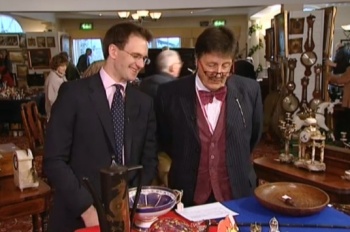 Charles Hanson, a regular expert but here appearing in his capacity as auctioneer, casts a critical eye over the teams' "bargains"
Charles Hanson, a regular expert but here appearing in his capacity as auctioneer, casts a critical eye over the teams' "bargains"After Tim Wonnacott took over the daytime version, the longer (45-minute and 1-hour) shows included a "swap" option whereby each team could swap one of their three chosen items for another selected by their expert, and purchased using whatever "leftover lolly" remained from the initial budget. More recently, the "swap" has been changed to a "bonus item", which the teams can choose - on the spot, during the auction - to add to their original three, having seen how well (or, more likely, how badly) their original items fared. The initial budget has also been upped to a dizzying £300 for each team, so now they can lose even more money than before.
Key moments
The - all too frequent - shows where both teams lose a packet on their 'bargains'.
On one celebrity special for Children in Need a boxed 007 Aston Martin toy car made a profit over £2000 after being bought for £2.
Chelsea Sines tells us that possibly the best profit on a regular show came in series 15, episode 12, when Philip Serrell's bonus item for the red team was a vase bought for £170 and sold for £780, making them a profit of £610. Losses on other items meant they "only" took home £604.
Another impressive win occurred on the 7 January 2011 edition, when a team under the guidance of expert Nick Hall managed a £497 profit. Had they not gone with Nick's bonus item, they would have taken home £525. The star item was a gourd-shaped vase which netted £515 profit. Do let us know if you've seen a better result.
An only slightly less impressive result was in Series 19 when an engaged couple (one of whom [the man, presumably - Ed.] looked the spitting image of Darren Bennett off of Strictly Come Dancing - and may in fact have been his twin brother, which would certainly explain it) were recommended to buy a £200 Pilkington vase which sold for £680. Losses on their other items led to an overall profit of £453.
A team of Nottingham students in Series 21 (from 2008) made a whopping overall profit of £413. This was mainly thanks to a Leon Gauche violin which they bought for £150 and sold for £580 thanks to substantial phone bids.
UKGameshows reader Oded Ross remembers the following, at the time probably the greatest profit made on three items outside of the charity shows:
- In 2005, a team of two ladies headed by David Barby made a whopping £361 profit, which probably made them the first team to double the money given to them at the start of the show.Their items were: 3 berry silver spoons in their original box, dated around 1900 (bought for £70, sold for £110); A pair of Corinthian silver candle holders, also c. 1900 (£49 -> £70), and a rare flatback ceramic statue of King John signing the Magna Carta at Runnymede, bought for £120, and sold for an unprecedented (at least in the daytime shows) £420!! A swap was possible but not made. The auctioneer was Elizabeth Talbot. Curiously, in the very next show David Barby led another team to a golden gavel, albeit with a much smaller profit.
In 2007, expert James Braxton possibly set the record for the worst ever "bonus buy": some modern Italian glass he bought for £105 were sold for £12, a loss to the contestants of £93.
Catchphrases
Wonnacott version: "Come back for some more Bargain Hunt, yes? Yes!"
Trivia
For a while in the Wonnacott era there was a trophy (of sorts), namely a golden (oak) gavel on a stand, if the team made a profit on all their items, though that didn't last very long. Nowadays a team which makes a profit or breaks even on all three items gets a Bargain Hunt enamelled badge (the sort with a stem).
The show marked its 500th daytime edition on 15 October 2007 with two teams of experts competing for charity, and revived the experts-only idea for a week of specials to mark its tenth anniversary in March 2010.
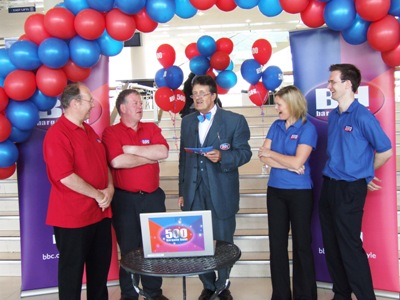 Tim Wonnacott celebrates the 500th daytime show with regular experts (l-r) David Barby, Philip Serrell, Kate Bliss and Charles Hanson
Tim Wonnacott celebrates the 500th daytime show with regular experts (l-r) David Barby, Philip Serrell, Kate Bliss and Charles HansonTim Wonnacott's participation in the 2014 series of Strictly Come Dancing meant he was unavailable to film some episodes. Bargain Hunt regulars Anita Manning, Paul Laidlaw, Christina Trevanion, and Charles Hanson took turns as guest presenters for some episodes of series 40, broadcast in early 2015 as a result. After an unspecified "bust up" with BBC producers was reported in the newspapers later that year, this arrangement became permanent and guest presenters have been used since. Wonnacott continued to be the voiceover for Celebrity Antiques Road Trip.
Ever wondered why Jarvis Cocker missed the end of his Pulp v Happy Mondays special episode? Bez got his girlfriend to buy a couple of the items he'd bought, and Cocker had left before anyone had spotted that this was a violation of the show's rules, which meant he wasn't available to reshoot. Deary me.
Web links
BBC programme pages: Bargain Hunt, Bargain Hunt: Famous Finds
Opening titles from 2002 and 2021 in the BBC Motion Graphics Archive
Merchandise
Pictures
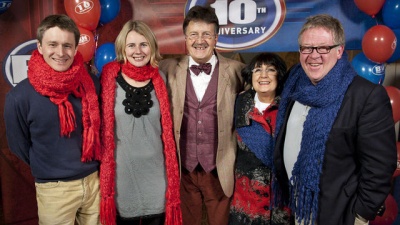 Tim marks the show's tenth anniversary in the company of Jonathan Pratt, Catherine Southon, Anita Manning and Philip Serrell
Tim marks the show's tenth anniversary in the company of Jonathan Pratt, Catherine Southon, Anita Manning and Philip SerrellHow to apply
Fill in the online application form or write to:
Bargain Hunt BBC Studios Roath Lock Porth Teigr Way Cardiff Bay CF10 4GA
Application details are provided as a service to readers, but please note that all contestant enquiries should be directed to the named production company and not to UKGameshows.com. Addresses can be found on our list of contact details for production companies.


